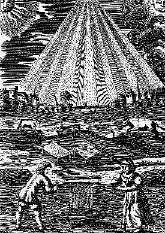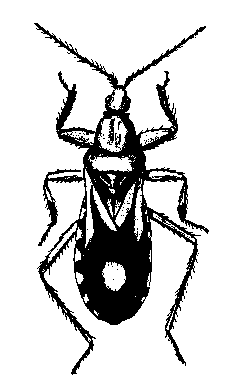In 1787
Catherine
Drinker
Bowen

There was a grandeur to the American scenery, a wild awesome invitation. Yet the land proved inhospitable to any who would not claim it by hard work. "I do not think America the place for a man of pleasure," wrote Thomas Cooper. Cooper was a highly educated scientist and theologian, who in the early 1790's emigrated to Pennsylvania with Dr. Priestley and settled in Northumberland County. Even in Philadelphia, Cooper knew, he said, of only one "professed gentleman --- i.e. idle, unoccupied person of fortune. Their time is not yet come." Cooper advised the prospective emigrant to avoid the seven-month winters of New Hampshire and Massachusetts, also the parching summers of New Jersey and the Carolinas. In New Jersey, Cooper reported, one found insects, reptiles, oppressive heat, fevers and ague.
- "The influence of a hot sun upon the moist and low land of the American coast almost infallibly subjects an European...to attacks of intermittents."
Like the celebrated Dr. Priestley, Cooper preferred northwest Pennsylvania, the high clear Susquehanna country. In Kentucky one risked continual danger from Indians.
And how hard it was to clear the land! "Grubbing," the Americans called it. For grubbing, laborers received three shillings a day, victuals and a dram of whiskey morning and evening. To quench great thirst by water alone, without spirits, was said to be extremely hazardous. In summer men had been seen to fall dead on the streets of Philadelphia after drinking cold water from the pumps. Bleeding was suggested, Moreau said, for those who drank too fast; some pumps bore a sign reading, "Death to him who drinks too quickly." And what quantities of spirituous liquors the Americans consumed! When drunk they had a propensity to fight; in the Southern and Western country, fistfights were looked on as a frolic. No rules were observed of honor or sport, and men gathered to watch two champions gouge out eyes, break jaws and bite off fingertips with every appearance of ferocious pleasure.
French visitors were apt to view this landscape and its people more genially. One September, three French noblemen, including the Marquis of Lafayette, set out from Albany on an expedition. James Madison happened to be one of the party. They planned to see the Oneida Indians and also a colony of Shakers in whom Lafayette, an ardent admirer of Dr. Mesmer in Paris, was especially interested because their practices resembled mesmerism. It was cold; Lafayette wore a rain cloak of gummed taffeta which had been sent him from France wrapped in newspapers. The papers had stuck to the gum, "so that," wrote Barbé-Marbois, "the curious could read, on his chest or back, the Journal de Paris, the Courier de I'Europe, or news from other places."
As for the Chevalier de Chastellux, he rode through the forests and the cities with a bluejay's feather in his cap, enjoying everything. It was natural to feel well disposed towards a people with whom one had fought side by side. In Connecticut the Chevalier went squirrel hunting, a diversion which he wrote was much in fashion in that part of the country. The animals, he said, were larger than those of Europe, with thicker fur, and very adroit in leaping from tree to tree. Should a squirrel be wounded without falling, it was only a slight inconvenience; somebody was usually within call to cut down the tree. "As squirrels are not rare," finished Chastellux, "one may conclude, and quite rightly, that trees are very common."
Squirrel ragout was tasty and gamy, though some preferred their squirrels fried for supper, with coffee. Travelers frequently carried their food with them, meat or cornmeal. Innkeepers let them cook it over the fire. Visitors were impressed with the American wild turkey, its size and appearance. "Why do not the Americans domesticate this noble bird?" asked William Priest. Frenchmen complained unsparingly of the American bread, but remarked that in a surprisingly short time a landlord could produce little hot galettes, baked and kneaded. Chastellux found them to his taste.
Persons of all ranks, it was noted, drank coffee and tea. The Americans breakfasted on what they called "relishes" --- salt fish, beefsteaks, broiled fowls, ham and bacon. Oysters were much eaten and the shad an excellent fish, but there existed "a fanatical law, passed by the Quakers," which prohibited catching shad on Sunday, a great waste, considering the fish remained in the river but a short time. The Bostonians ate fish every Saturday "to benefit their fisheries," and in private houses grace was said before meat. Barbé-Marbois noted that all the courses, even dessert, were put on the table at one time. Tablecloths fell over the knees and took the place of napkins, after the English style. In Boston --- a town of eighteen thousand --- everything reminded travelers of London: the brick and wooden houses, the customs, even the speech and accent. But it seemed odd that on a warm August day people paid calls dressed in velvet, satin and damask. In the country, stone fences divided men's property. New England churches were clean and well lighted; to the Frenchmen they did not look like churches. One found oneself in a room with benches, lacking paintings or ornaments --- "no addresses to the heart and the imagination." Yet one met no beggars therein,
- "nor even" [wrote Barbé-Marbois]"an untidily dressed man, no one from the hospital for the blind to hit you with his stick, nor verger to interrupt you with the noise of his halberd."
Connecticut, travelers noted, was as closely populated as England; one passed continually through towns and villages. Hartford had no galleries, public gardens or palaces, but Barbé-Marbois was shown the Charter Oak. "In this country," he wrote, "everything which has any connection with liberty is sacred." And what odd customs were attributed to liberty and equality! --- even the barbarous custom of admitting another man to one's bed when one was asleep at an inn. Another sign of this so-called liberty, wrote Moreau, was the refusal of a carriage to alter its course when passing, unless threatened with collision by a heavier vehicle. It was charming to see schoolchildren, girls and boys, draw up in line along the road and salute the passing stranger by curtsies or doffing the hat, though some Americans protested the custom as servile, a relic of the old country.
New York (population thirty-three thousand) in 1787 still showed the ravages of war. The city had been occupied by the enemy for seven years, till the English left and the Tories with them. Now the wharves were tumbledown, bereft of ships; the great fire had swept away almost every building on Broadway, including Trinity Church. What remained was a collection of wooden hovels and gabled Dutch houses of yellow brick. In the East and North Rivers one saw porpoises. Baltimore, with its thirteen thousand inhabitants, was badly paved, "with scarcely a dozen lamps in the whole town."
Nearly every French traveler commented on the high scale of living in America. Brissot de Warville remarked that it was not rare to see a carter driving his cart and eating a turkey wing and some white bread. Wages for laborers and servants were high, much higher than in Europe, and when a vessel loaded with Scotchmen landed in New York, "the next day there was not one who was not hired out and busy." Travelers agreed that the further south one went, the more this condition deteriorated. It was in Virginia that Chastellux saw poor people "for the first time," he said, "since I crossed the sea." Not only the Negro slaves but the wan and ragged whites in their miserable huts aroused his pity. In Virginia the horses were beautiful, finely bred to race. Gentlemen's houses were spacious, well furnished with linen and silver plate, but few had books or libraries and the plantation manors were crowded as to bedrooms: "they think nothing of putting three or four persons in the same room."  The seed ticks made life miserable in summer, and the bedbugs which Virginia called chinches. With Southerners the drinking of spirituous liquors was a delightful --- and frequent --- ceremony which involved extraordinary mixtures: mint sling, pumpkin flip, bumbo, apple toddy.
The seed ticks made life miserable in summer, and the bedbugs which Virginia called chinches. With Southerners the drinking of spirituous liquors was a delightful --- and frequent --- ceremony which involved extraordinary mixtures: mint sling, pumpkin flip, bumbo, apple toddy.
In Virginia, Chastellux met with his first pioneer, a young man who had come from Philadelphia with his pretty wife and babe, and was setting out for "Kentucket." Chastellux was astonished at the easy manner in which this pioneer proceeded on his expedition, with but one horse, no cattle and no tools. "I have money in my pocket," the young man said stoutly, "and shall want for nothing." In Pennsylvania good lands were "too expensive to get." This nonchalance at moving about seemed indeed one of the most striking traits of Americans.
- "Four times running" [wrote Moreau,] "they will break land for a new home, abandoning without a thought the house in which they were born, the church where they learned about God, the tombs of their fathers, the friends of their childhood, the companions of their youth, and all the pleasures of their first society."
The American clung to nothing. At a price, said Moreau, he would part with "his house, his carriage, his horse, his god."
It was the very antithesis of Europe, this repudiation of the past, and for the foreigner it repelled or inspired according to his personal philosophy.